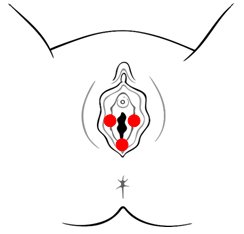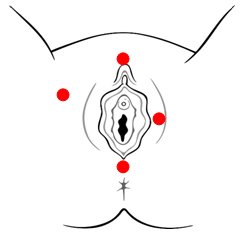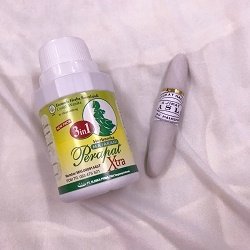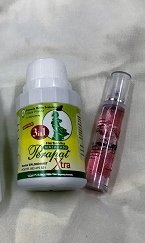Understanding Vulvodynia
Vulvodynia is chronic pain around the vulva that is not caused by vaginal infections, sexually transmitted disease or cancer.
It is likely that many factors are involved including those related to the body’s nerves, hormones and immune system.
The intensity of pain can vary from mild discomfort to a severe constant pain. Some women describe the pain as aching, throbbing and swelling. For others the pain is likened to being stab with a knife or being stuck with a needle in the vaginal area.
Types Of Vulvar Pain
Vulvar pain can be categorized into provoked aka Vulvar Vestibulitis Syndrome (VVS) and unprovoked or generalized vulvodynia (GV).
As shown in the diagram above, VVS-(provoked vagina pain) is characterized by pain limited to the vestibule, the area surrounding the opening of the vagina (note the 3 red dots). It occurs during or after pressure is applied to the area such as:
- sexual intercourse
- tampon insertion
- prolonged sitting
- horse riding or cycling
- wearing tight fitting pants
For women who have GV – (unprovoked vulva pain), the pain occurs spontaneously and is constant. As with long term pain from any cause, there might be some good days and bad days. Applying pressure to the area, such as sitting for prolong periods will intensify the pain.
The pain from unprovoked vulvodynia is not restricted to the vulva area. Some women experience pain in the left labia or near the clitoris, while others might felt the pain in multiple areas e.g. in the labia, clitoris, vestibule, perineum and inner thighs as shown in the diagram.
Causes of Vulvodynia
Vulvar pain is a complex pain disorder.
Many factors are involved. One or more of the following causes might act
together to trigger the pain.
Damage or irritation of the nerves of the vulva – a previous vaginal surgery might damage the nerves. Irritation of the nerves can be caused by perfumed soaps, bubble bath, douches and anti-fungal cream.
Increase number and hyper-sensitivity of nerve endings in the vulva – The abnormal nerve fiber signals are felt as sensations of pain by the women. An attack of shingles can also cause this kind of nerve-type pain. Once the rash of shingles disappears, the area where the shingles was remains intensely painful and sore despite the skin appearing normal.
Changes in hormone level - a drop in estrogen levels during menopause might lead to vaginal dryness. Friction from intercourse worsens the condition and the vulva becomes inflamed and swollen.
Weak pelvic floor muscles – the slack pelvic floor muscles exerts pressure on the nerves in the vulva area.
Vulvar Care Tips
Wear 100% white cotton panties and loose fitting skirt and pants.
Avoid scented vaginal care products. Opt for this herbal feminine wash.
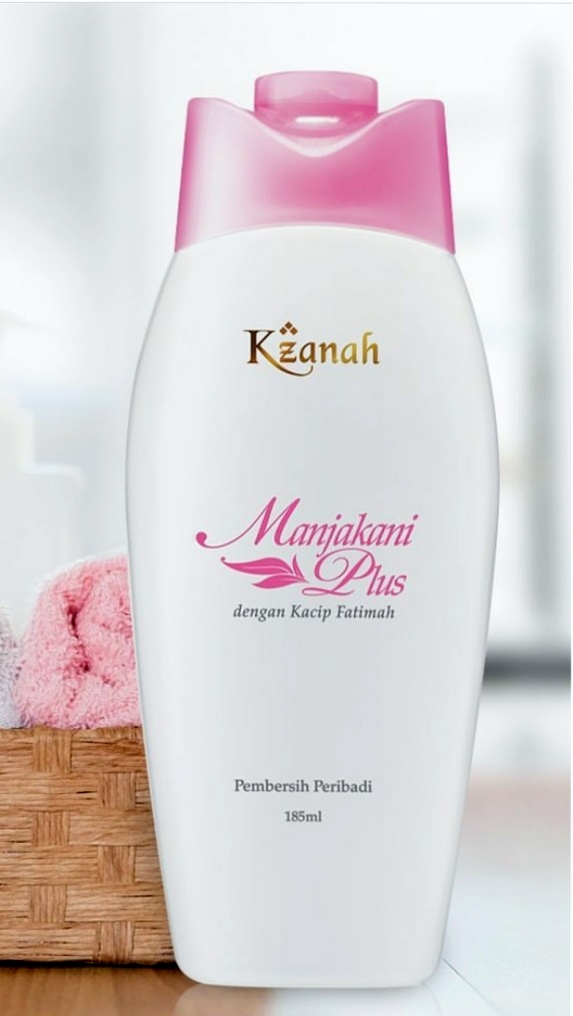
This feminine wash maintains the vagina's natural pH balance of 3.5. It is soap-free gentle foaming herbal feminine wash that combines the time-tested formula of manjakani and kacip fatimah. Two botanical extracts that are well-known for their natural antiseptic and astringent properties. This ultra mild (pH3.5 formula):-
- Helps tighten and tone vaginal walls to maintain that youthful honeymoon-fit.
- Helps prevent infections which cause unpleasant odor, itchiness and discharge.
- Refreshes, soothes, deodorizes and keeps the intimate area protected and comfortable. Even on days when you have your period.
Pour a small amount of this herbal feminine wash onto wet palms and gently cleanse the intimate area. Rinse thoroughly. You get a very fresh and cooling feeling after cleansing with this wash.
Manjakani Vagina Gel for Easing Vagina Pain
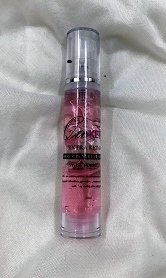
A gentle water-based vaginal gel with natural Manjakani and Pueraria Mirifica extracts. Pump 2 -3 drops of this love gel on your index finger and swipe it inside the vagina. Your vagina will tighten and well lubricated within 15-30 minutes after application.
This vaginal tightening gel can effectively:-
- Tone and tighten the vaginal muscle for that honeymoon fit. Heighten intimate sensation for both partners.
- Ward off infections that may cause excessive discharge, itch and unpleasant odor.
- Restore woman's natural lubrication and ease vagina pain. It also promote vaginal tissue health and elasticity.
- Treat vaginal boils, including minor sores and bruises.
This vaginal gel provides relief for vaginal pain during sex. To further reduce the pain and have pleasurable sex experiment with different sex positions. Woman on top where she is in control can ease the pain.
- Evaluate your diet. Keep a food diary to track if certain foods are triggering the pain. This takes time but it is worth the effort. Knowing what foods to avoid can reduce the pain to an acceptable level without the use of medication.
- Avoid pools or hot tubs with chlorinated water.
- Sit in a cool sitz bath or apply ice packs to reduce the throbbing (Learn how to prepare a sitz bath or ice packs here).
- Do kegels to strengthen your pelvic floor muscles.
- If you have to sit for long hours, sit on rubber foam doughnut to ease the pressure on the vagina.
Treating Vulvodynia
Open up to your gynecologist to determine the best treatment. Pain that originates from nerve fibers is best treated with drugs that alter the way in which nerve fibers transmit their impulses to the spinal cord and give the sensation of pain.
Prescriptin drugs such as Tricyclic antidepressants have some success in treating chronic vaginal pain. As with most drugs, tricyclic tablets might cause side-effects such as constipation, dry mouth and blurred vision.
Other options : Therapy Treatment
- Physical therapy which involves exercise to strengthen the pelvic floor muscles and lessen muscle spasms
- Bio feedback, which helps you to relax the vaginal muscles and reduce the pain
There is no one treatment for vulvodynia that works for all women. You may need to try a combination of treatments to get the best results. Since vaginal pain affects a woman emotionally, it helps to join a support group so that you know you are not suffering alone.
Back to top- Home
- Vaginal Pain
- Vulvodynia
Related Pages
- Painful Intercourse Solutions
- Vaginal Moisturizers
- Natural Remedies for Vaginal Dryness
- Vaginal Massage
